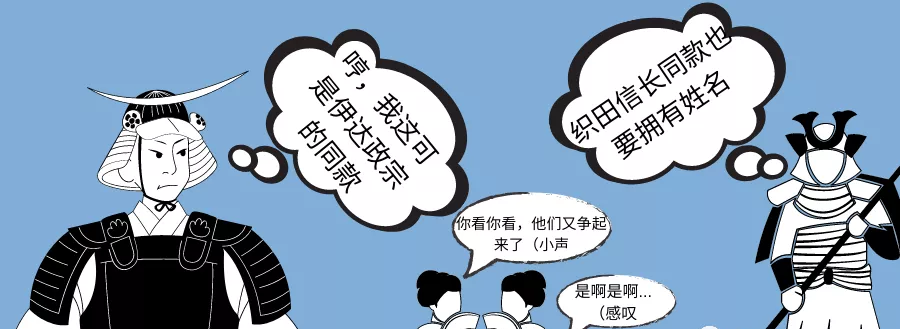It was a troubled world.
An era of "collapse and bad luck",
All kinds of heroes have appeared;
That was a turning point in Japanese history.
It has profoundly affected the national character and psychology of the Japanese people.
The era that left many admirable heroic legends for future generations,
An era that created blueprints for countless film and television dramas, anime, and games.
Japan Sengoku,
From the late Muromachi shogunate in Japan to the end of the Azuchi-Momoyama period,
It's the best cut to learn about Japanese culture.
Today's content,
That's where it starts.
The book continues above,
Today I want to talk to you about the strangely shaped armor of the Japanese samurai.
"Yum! You have sharp horns on your head, don't come here!" ”

If you've ever played Glory Company's Peerless series,
Or have seen related TV series, anime,
I believe you must be deeply impressed by his style,
Date Masamune
The horns on this man's head are even a bit like boomerangs
In order to fully show everyone how big the decoration on his helmet is,
Let's take a look at the following pictures,
The picture shows a statue of Date Masamune, commissioned by his wife, Aiko-in (Aihime, daughter of Kiyohide Tamura, lord of Sanharu Castle), and placed at Seogan-ji Temple in 1652
The statue, erected to commemorate the 300th anniversary of Masamune Itachi's death, is located in Sendai City, Japan. The bronze statue was re-erected in 1962 and stands to this day.
Take a look at an armor restoration
See, this horn, it's so big! (Vibrating)
And Sanada Yukimura, which I really like,
You think,
His horns,
Isn't it big?
naive
The classic main colors are red armor and a hand-held saffian gun
The six pennies and antlers on the helmet are representative
This does not allow everyone to intuitively see the full picture of his helmet,
The huge antlers are one of the hallmarks of Sanada Yukimura's armor
A bronze statue of Sanada Yukimura riding a horse in Ueda Castle can be seen from JR Ueda Station
What we all know is that
In the beginning, the helmet appeared as a defensive item.
But with the evolution of the Japanese generals at that time also added a lot of self-characteristic factors into it.
From different shapes, to express the majesty and status of the general.
Although the design of the helmet is various, the basic structure is roughly the same,
It is composed of standing objects, plutoniums, blowbacks and other parts.
The style of the helmets of the two warriors we saw above,
Yatsuko "Corner", "Standing" in Japan,
Depending on the location, the front stand on the brain gate, the side is the stand, and the head stand on the celestial cover.
The rise of the horn was in the Heian period in Japan,
Originally existed as an ornament,
On the top of Naoe's brain gate is the love word of King Ai dyeing Ming
When there is a war,
There will be a group of people called "Battle Eye Fu け" who are specifically responsible for monitoring whether their military generals have the courage to fight, take down enemy generals, or break through checkpoints and other records.
In order for these people to be able to clearly distinguish the difference between themselves and others,
Warriors will make distinctive decorations on their armor,
For example, it's something on a helmet.
Or the color of his armor (Maeda painted his armor big red).
However, the decorations on the helmets of some warriors are designed according to the personality or life of different warriors.
Take, for example, the two warriors we mentioned earlier.
The main feature of Date Masamune's helmet is the "Three-Day Moon Type".
According to historical records, the main reason for his choice of the three-day-moon type is two different theories.
One is because of the influence of religion,
The religion he believed in was the Myokan faith, a Japanese branch of "Taoism".
Because it is rooted in Taoism, it follows the changes of the sun, moon, and stars,
And he belongs to the moon sect, so he chose a crescent-shaped horn.
Another theory is from hideyoshi Toyotomi's "imperial gift",
So I have always used the crescent shape.
And the reason why Sanada Yukimura chose antlers,
Because he thought that the deer were messengers sent to the earth by the gods,
He saw the deer walking on the ground as they walked among the precipitous peaks,
Think of it as the power of the gods.
So
It may also be a good choice to give the enemy a meteor head mallet on the battlefield ~ (I said blindly